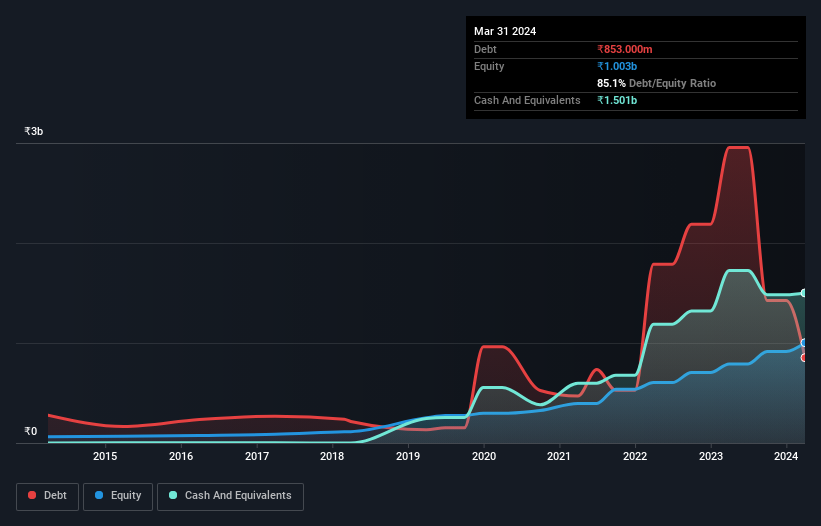- India
- /
- Trade Distributors
- /
- NSEI:ANMOL
These 4 Measures Indicate That Anmol India (NSE:ANMOL) Is Using Debt Reasonably Well
The external fund manager backed by Berkshire Hathaway's Charlie Munger, Li Lu, makes no bones about it when he says 'The biggest investment risk is not the volatility of prices, but whether you will suffer a permanent loss of capital.' When we think about how risky a company is, we always like to look at its use of debt, since debt overload can lead to ruin. We note that Anmol India Limited (NSE:ANMOL) does have debt on its balance sheet. But the more important question is: how much risk is that debt creating?
When Is Debt A Problem?
Debt is a tool to help businesses grow, but if a business is incapable of paying off its lenders, then it exists at their mercy. If things get really bad, the lenders can take control of the business. While that is not too common, we often do see indebted companies permanently diluting shareholders because lenders force them to raise capital at a distressed price. Of course, the upside of debt is that it often represents cheap capital, especially when it replaces dilution in a company with the ability to reinvest at high rates of return. The first step when considering a company's debt levels is to consider its cash and debt together.
See our latest analysis for Anmol India
How Much Debt Does Anmol India Carry?
As you can see below, Anmol India had ₹853.0m of debt at March 2024, down from ₹2.95b a year prior. However, it does have ₹1.50b in cash offsetting this, leading to net cash of ₹648.0m.

How Strong Is Anmol India's Balance Sheet?
According to the last reported balance sheet, Anmol India had liabilities of ₹1.41b due within 12 months, and liabilities of ₹409.3m due beyond 12 months. On the other hand, it had cash of ₹1.50b and ₹554.4m worth of receivables due within a year. So it actually has ₹234.1m more liquid assets than total liabilities.
This surplus suggests that Anmol India has a conservative balance sheet, and could probably eliminate its debt without much difficulty. Simply put, the fact that Anmol India has more cash than debt is arguably a good indication that it can manage its debt safely.
Notably Anmol India's EBIT was pretty flat over the last year. We would prefer to see some earnings growth, because that always helps diminish debt. The balance sheet is clearly the area to focus on when you are analysing debt. But it is Anmol India's earnings that will influence how the balance sheet holds up in the future. So when considering debt, it's definitely worth looking at the earnings trend. Click here for an interactive snapshot.
But our final consideration is also important, because a company cannot pay debt with paper profits; it needs cold hard cash. While Anmol India has net cash on its balance sheet, it's still worth taking a look at its ability to convert earnings before interest and tax (EBIT) to free cash flow, to help us understand how quickly it is building (or eroding) that cash balance. Happily for any shareholders, Anmol India actually produced more free cash flow than EBIT over the last three years. That sort of strong cash conversion gets us as excited as the crowd when the beat drops at a Daft Punk concert.
Summing Up
While it is always sensible to investigate a company's debt, in this case Anmol India has ₹648.0m in net cash and a decent-looking balance sheet. And it impressed us with free cash flow of ₹2.1b, being 131% of its EBIT. So is Anmol India's debt a risk? It doesn't seem so to us. The balance sheet is clearly the area to focus on when you are analysing debt. However, not all investment risk resides within the balance sheet - far from it. For example - Anmol India has 1 warning sign we think you should be aware of.
At the end of the day, it's often better to focus on companies that are free from net debt. You can access our special list of such companies (all with a track record of profit growth). It's free.
New: Manage All Your Stock Portfolios in One Place
We've created the ultimate portfolio companion for stock investors, and it's free.
• Connect an unlimited number of Portfolios and see your total in one currency
• Be alerted to new Warning Signs or Risks via email or mobile
• Track the Fair Value of your stocks
Have feedback on this article? Concerned about the content? Get in touch with us directly. Alternatively, email editorial-team (at) simplywallst.com.
This article by Simply Wall St is general in nature. We provide commentary based on historical data and analyst forecasts only using an unbiased methodology and our articles are not intended to be financial advice. It does not constitute a recommendation to buy or sell any stock, and does not take account of your objectives, or your financial situation. We aim to bring you long-term focused analysis driven by fundamental data. Note that our analysis may not factor in the latest price-sensitive company announcements or qualitative material. Simply Wall St has no position in any stocks mentioned.
About NSEI:ANMOL
Mediocre balance sheet with low risk.
Similar Companies
Market Insights
Community Narratives




